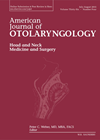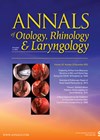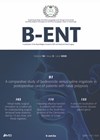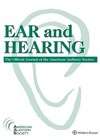
Journal Reviews archive for January 2024
Nasal septoplasty: is it more effective than medical management?
Question1. How do we know that undertaking an operation will benefit a patient? Question 2. How do policy makers / health systems know an operation is effective and ‘good value for money’? As trained professionals, we spend our careers seeking...
Active surveillance for papillary thyroid cancers – what is the risk of progression?
Papillary thyroid cancers (PTCs) are generally considered to be indolent malignancies with favourable outcomes. Active surveillance (AS) has consequently been trialled as a management option for small PTCs with no evidence of regional lymph node involvement, especially papillary thyroid microcarcinomas...
A new treatment for smell loss?
It has been well established that smell training can be effective in the recovery of smell function post Covid-19 infection, and many other treatment modalities have been assessed. There have been limited studies to date evaluating the effects of dietary...
Is Gamma Knife Surgery effective for intracanalicular vestibular schwannomas?
Vestibular schwannomas (VSs) are rare, occurring in approximately five per 100,000 adults a year. In circa 8% of cases, the VS is contained within the internal auditory canal, i.e. intracanalicular (iVS). Although radiosurgery is a recognised treatment modality for VSs,...
Dizziness questionnaire and telemedicine during Covid pandemic
During the initial phases of the Covid-19 pandemic in 2020, delivery of ENT care adapted significantly. Kaleva et al present their findings of telephone balance consultations during the pandemic with a randomised prospective study utilising a dizziness questionnaire in West...
Factors associated with laryngopharyngeal reflux
This Chinese cross-sectional survey across three hospitals and 320 patients looked at the effect of unhealthy lifestyles and eating habits, as well as psychological difficulties, on the development of laryngopharyngeal reflux (LPR). All the participants underwent gastroscopy, laryngoscopy and various...
The decision-making process by parents of children with residual hearing who receive cochlear implants
It can be a difficult decision for parents whose children have residual hearing whether or not to undergo cochlear implantation. Their children may seem to be hearing with their hearing aids, and even in some cases can hear without aids....
How common is self-reported dysphagia in the general population?
Healthcare policymakers and commissioners of services often review incidence and prevalence data when deciding on resource allocation. The authors of this paper have capitalised on a large dataset, the Canadian Longitudinal Study on Aging (CLSA), which collects data on over...
Are cardiovascular risk factors associated with hearing loss?
Cardiovascular disease (CVD) risk factors are associated with microvascular damage that can impair molecular transport across capillary walls and cause inflammation and oxidative stress that may damage cochlear structure and function. This study determined, among a population-based sample of Canadian...
Still not smelling
Post-Covid anosmia/hyposmia is a troublesome persistent symptom for lots of patients. Management is still elusive. This was a nationwide survey of ENT practitioners. Of the 715 surveyed members, only 7.4% responded. Most performed a nasal endoscopy, 60% ordered an MRI...
Supracricoid laryngectomy revisited
In this article, the authors report on the long-term (five- and 10-year) survival, local recurrence rate and cause of death in a cohort of 46 patients with T3M0N0 glottic carcinoma undergoing supracricoid laryngectomy. The five- and 10-year survival were 78%...
Evolution of salivary gland pathology classifications
Targeted therapies for malignant salivary gland tumours have changed the treatment paradigm and therapy approaches. Better outcomes are now feasible. Choosing the treatment method requires a clear classification of the lesions. The authors of this paper reviewed the World Health...
















